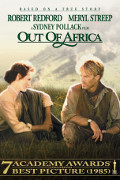
Directed by
Sydney Pollack
161 minutes
Rated M
Reviewed by
Bernard Hemingway

Out Of Africa
Sydney Pollock’s film, based on the memoirs of Karen Blixen (who published under the nom de plume of Isak Dinesen is a handsome film that manages to combine a strong female lead with an at-times Mills and Boon-ish story of a woman’s travails in a man's world.
Pollack, with the help of marvellous cinematography by David Watkin (only marred by some ill-advised back-projection), an elegant script by Kurt Luedtke, a lush score by John Barry and impressive costume and production design gives an epic sweep (the time period covered is, roughly, 1913-1931) to Blixen’s story of how she came to colonial Kenya, fell in love with the country and its people but out of love with her philandering husband (Karl Maria Brandauer) and then in love with a handsome English adventurer (Robert Redford who keeps his American accent) but little dynamism in a film that is unfailingly high quality in every department but almost overwhelmingly decorous.
Streep, needless to say, is splendid as Blixen (who has a fabulous outfit for every occasion, whether going to a ball or a funeral) but, as is so often the case with her performances, she leaves little air for her opposite number. Thus Redford (whether he was capable of more is another question) has little to do but play the dashing dream-boat in his Indiana Jones outfits and their romance is largely intellectual. Not that this is necessarily a bad thing, particularly for American film, but it tends to be an issue when there is so little else going on (one expects more from Blixen’s husband but he remains steadfastly in the background as indeed does WWI and the re-distribution of colonial Africa).
Although over-long It is little surprise that the film swept the 1985 Oscars taking out Best Picture, Director, Original Score, Adapted Screenplay and Cinematography. On the other hand in a year when The Colour Purple won none of its 11 nominations, Out of Africa was criticized for racial stereotyping.
FYI: Audrey Hepburn was originally offered the role of Karen and Orson Welles and Nicolas Roeg were contenders for the director’s chair as was David Lean, to whose films Pollack no doubt owes much.
Want something different?





